Farm Bill Tops the Agenda
Farm bill negotiations were in serious limbo when the Beltwide Cotton Conferences were called to order by National Cotton Council Chairman John Pucheu.
“When Council leaders convened during our annual meeting last February in Austin, it was critically important that we had a policy consensus within the industry as we addressed our priorities for new farm legislation and trade,” said the Tranquillity, CA, producer. “During our meeting in Austin, the Council was able to re-confirm our priorities for sound farm policy. We also prepared to undertake a number of internal initiatives in preparation for the farm bill debate.”
It quickly became clear, Pucheu emphasized, that cotton was targeted for change. “The current farm bill and the current cotton program received unwarranted, and yet significant, criticism,” he said. “Our situation was made worse by the attention the U.S. cotton program received in the WTO, with the ongoing case brought by Brazil, and the unfounded claims by Oxfam and other international groups that the U.S. cotton program is the cause of the economic difficulties faced by West African cotton growers.”
John Maguire, NCC’s Senior Vice President, Washington Operations, said, “Interestingly, the process of writing the new legislation started almost two years before the scheduled expiration of the current. Yet, the 2002 farm law has never been amended, and has been universally praised by growers.
“In fact,” he continued, “there are those who would prefer a simple extension of the 2002 farm law to a new farm bill … but it has been the subject of constant criticism from numerous sources from the day it was signed into law.”
There are also major budgetary differences in the 2002 farm bill and what is being debated today. “The 2002 farm bill was developed during a time of budget surplus; the new farm bill is confronted with budget deficits,” Pucheu explained. “CBO’s baseline spending projections, which are based on an extension of current policies, have resulted in a budget environment that has made it very difficult to hold onto the necessary funding for maintaining existing programs.
“In addition,” he continued, “the (Bush) Administration has maintained that the cotton program is not functioning properly and is in need of radical change.”
And, in fact, Bush has threatened a veto if the bill passes Congress in the form that is expected to emerge from debates.
WTO Activity
Pucheu said the NCC continues its active involvement in WTO issues, including the Brazil compliance case and Doha agricultural negotiations. “Brazil’s case, which was heard by the compliance panel in late February, contends that U.S. actions — relative to the programs for Step 2, export credit guarantees, marketing loans and countercyclical payments — are not enough to comply with the original ruling,” he explained. “Council staff were in Geneva during these proceedings to assist the U.S. defense team throughout the entire process and have worked closely with the U.S. team with rebuttal submissions and answers to the panel’s questions.”
Added Maguire, “(Our) cotton program has been the subject of constant criticism from numerous sources since the day it was signed into law. As Congress began the process of writing new farm law, the cotton program was singled out as requiring major reform. At the time, the successful WTO challenge by Brazil was fueling criticism, and the European Union and others were working to isolate U.S. cotton in the Doha negotiations.
“They called for more ambitious and expeditious change, charging, among other things, that the U.S. program was responsible for the demise of the West African cotton industry, even though those producers receive a fraction of the world price because of the structure of their industry.”
In late July, the WTO dispute panel sent its preliminary ruling to both the U.S. and Brazilian governments, and it was publicly released in December. The NCC has urged the Office of the U.S. Trade Representative (USTR) to appeal the decision. If USTR proceeds with an expedited appeal, it could be final by early May, Pucheu said.
Captions (2):
John Maguire
John Pucheu (right) was named Chairman of the National Cotton Council in February of 2006, succeeding Allen Helms (left).








